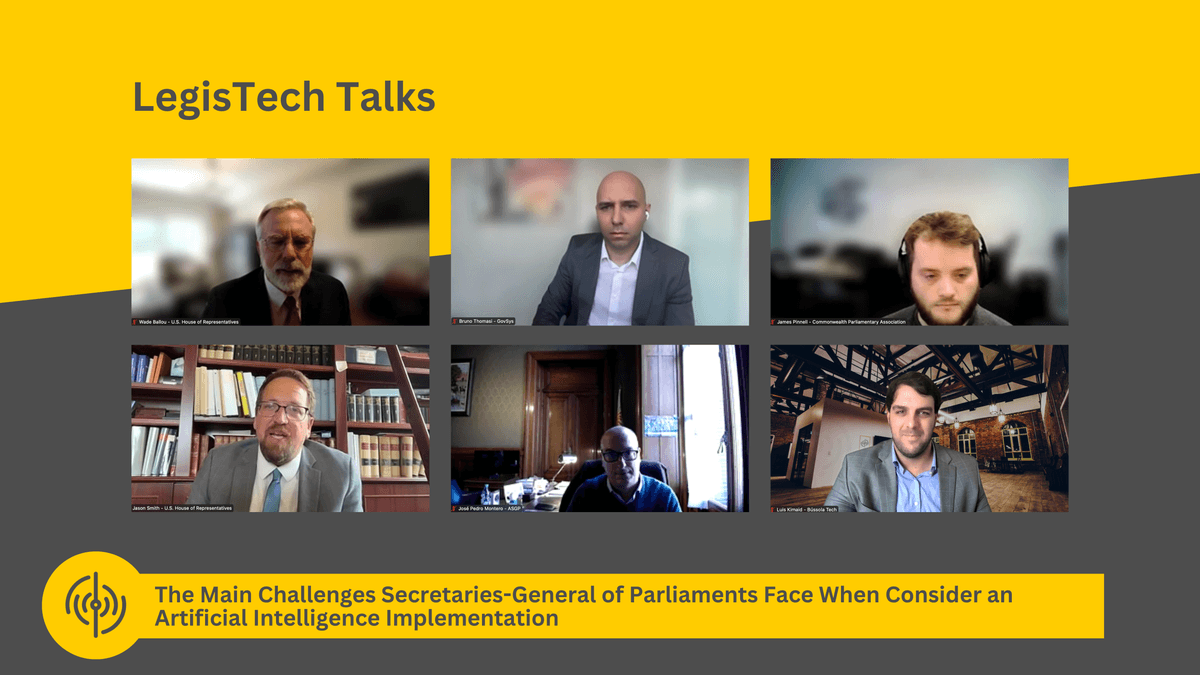
Panel Discussion about The Main Challenges Secretaries-General of Parliaments Face When Consider an Artificial Intelligence Implementation
How it was

On August 15th, 2025, Bússola Tech hosted a high-level panel discussion titled “The Main Challenges Secretaries-General of Parliaments Face When Considering an Artificial Intelligence Implementation.” The session brought together senior parliamentary leaders and experts to examine the institutional, strategic, and operational complexities that arise when adopting artificial intelligence in legislatures.
Moderated by Mr. Wade Ballou, Legislative Counsel (Retired) at the U.S. House of Representatives, the panel featured Mr. Bruno Thomasi, CEO at GovSys; Mr. James Pinnell, Deputy Head of Programmes at the Commonwealth Parliamentary Association; Mr. Jason Smith, Parliamentarian at the U.S. House of Representatives; and Mr. José Pedro Montero, Secretary-General at the Cámara de Senadores de Uruguay and President of the Association of the Secretaries-General of Parliaments.
The session opened with introductory remarks from each participant. Mr. Montero underscored the difficulties faced by Secretaries-General in balancing institutional traditions with the disruptive nature of AI, highlighting the need for robust governance frameworks, ethical safeguards, and gradual, step-by-step implementation. Mr. Pinnell stressed that AI adoption must start from institutional mandates rather than technological trends, warning against “solutions in search of a problem” and calling for pilot projects, capacity-building, and inclusive stakeholder engagement. Mr. Smith shared the U.S. House of Representatives’ experience in building continuous communities of practice around modernization, emphasizing the importance of trust, agency, and ongoing dialogue to reduce resistance and foster institutional buy-in. Mr. Thomasi offered a technological perspective, noting that parliamentary innovation is never just about systems but about harmonizing people, processes, and expectations. He advocated for incremental pilots, framing AI benefits in terms relevant to each stakeholder group, and ensuring that small wins are communicated widely to build momentum.
The discussion evolved into a structured examination of core challenges:
- Governance and ethics in AI adoption, including transparency, accountability, and safeguards against systemic risks.
- Change management strategies to overcome institutional inertia, address emotional resistance, and empower staff and legislators through training and participation.
- Resilience in facing the unexpected, through scenario planning, safe testing environments, and open communication channels to address failures before they escalate.
- The role of transparency not only towards the public but also within parliamentary institutions, ensuring trust among staff, members, and external stakeholders.
Closing reflections emphasized that artificial intelligence in parliaments cannot be treated merely as a technical upgrade. Instead, it represents a deeper institutional transformation that touches the core of democratic practice. The panelists agreed that success depends on gradual experimentation, strong ethical frameworks, sustained capacity-building, and a cultural shift toward transparency and trust.
Overall, the session provided a comprehensive account of the strategic, organizational, and cultural dimensions of AI adoption in legislatures, offering practical insights for parliaments seeking to harness emerging technologies while preserving democratic legitimacy and institutional resilience.
Strategic Partners

Privacy Policy



